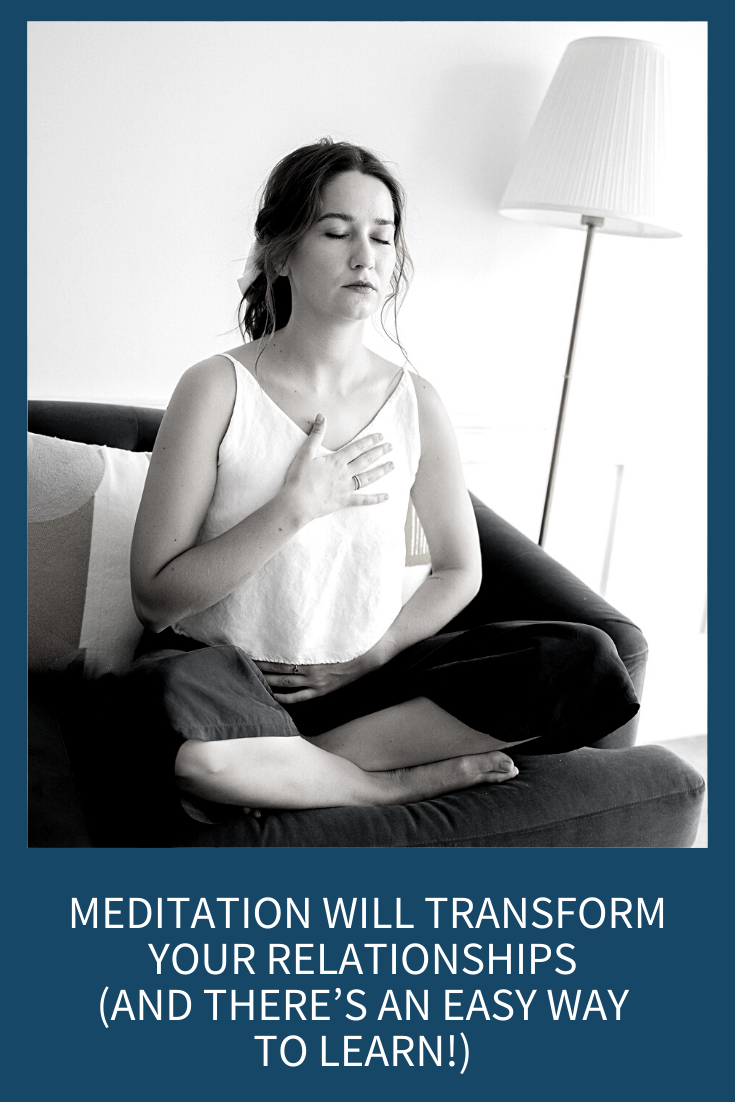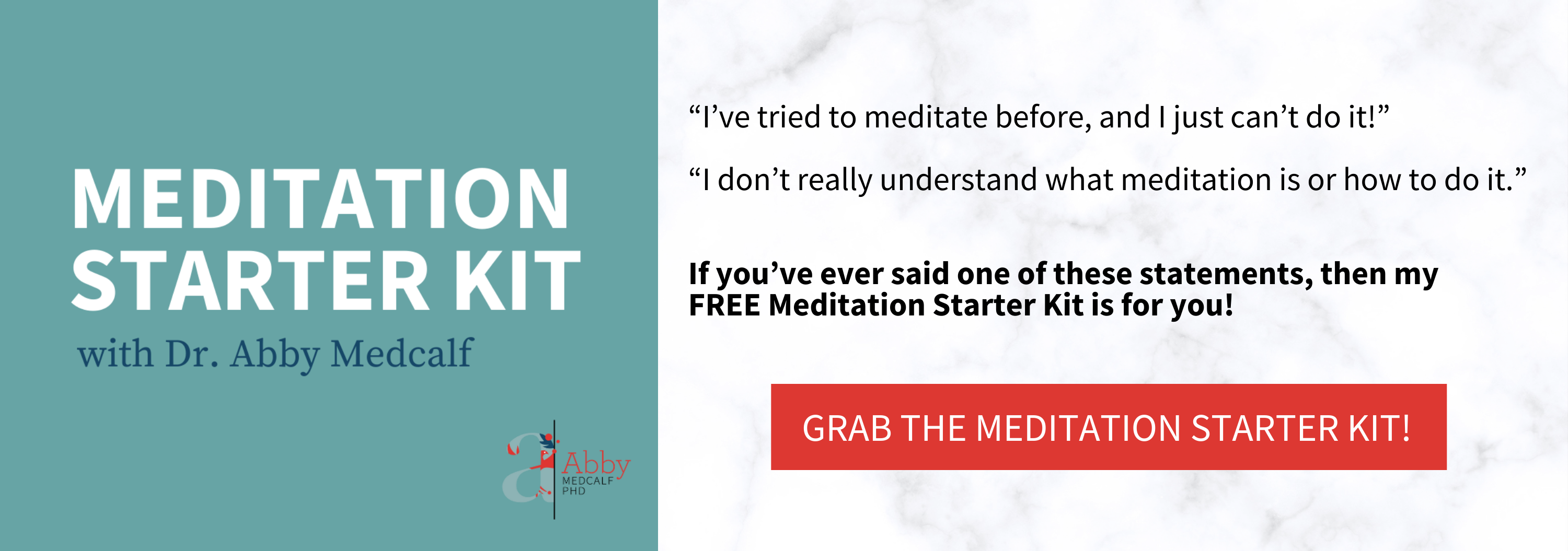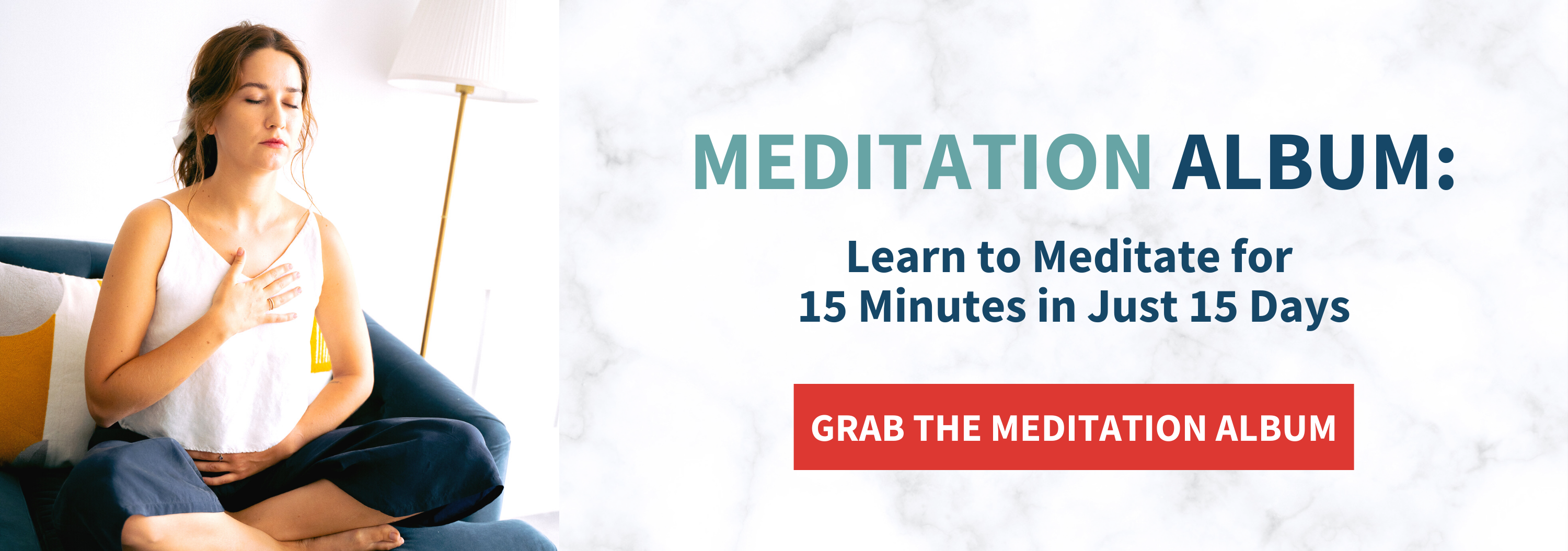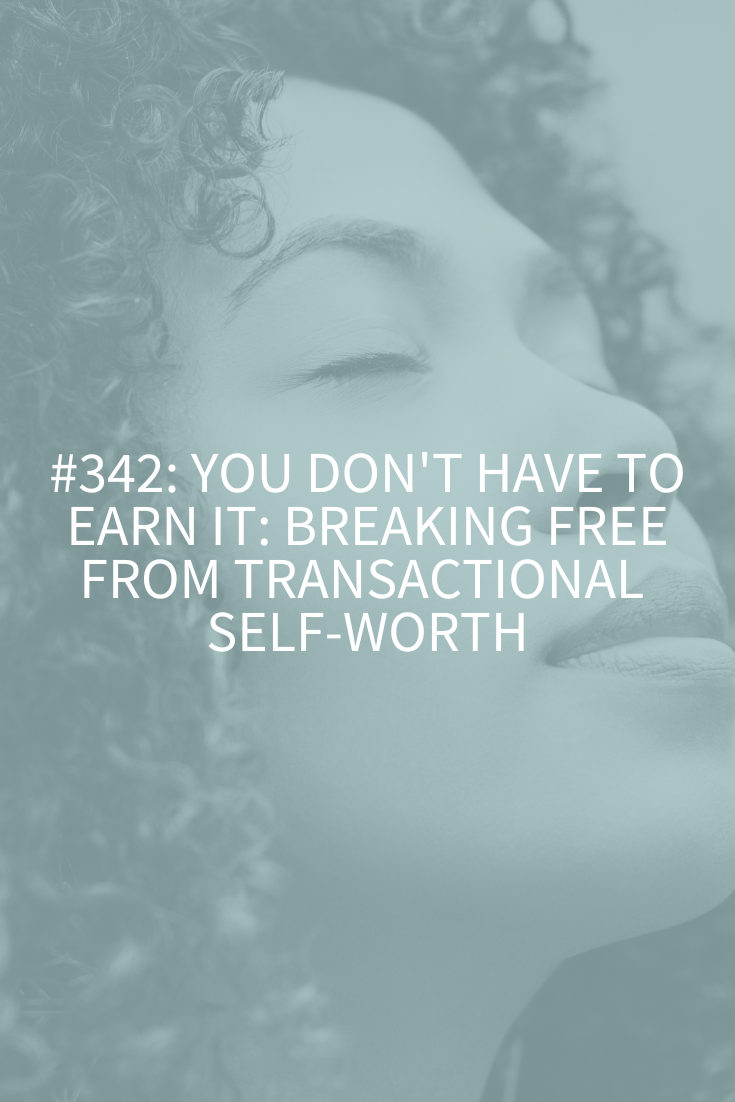
It’s easier than you think to become amazing at meditation and just 15 minutes of meditation a day will change your life! Imagine feeling calmer and in charge of your emotions. Imagine feeling more content in your life and confident in your decisions. Imagine all your relationships improving as you’re able to communicate more effectively. Imagine stopping the self-doubt, regrets and guilt! Today I’m teaching you how meditation benefits your relationships, why you’re not meditating and my simple steps to making it an easy part of your day.
What Exactly is Meditation?
Meditation is about focusing your attention and awareness. You’re not trying to turn off your thoughts and feelings as much as you’re trying to observe them without judgment.
There are many types of meditation practices. You’ve likely heard about mindfulness or focused meditation but there’s also walking/movement meditation, mantra, loving kindness and transcendental (to name a few).
What I’m going to talk and teach about today is in the category of focused or mindful meditation. Basically, it’s about focusing on something like your breathing or a sound and doing your best to stay focused during the time you’re meditating.
Meditation is not about nothing. It’s not about emptying your mind because your mind will absolutely wander but that’s actually part of the meditation! Meditation is really about focusing on something, noticing that your mind has wandered and then bringing it back to your original focus.
Here’s how I think about it. If you went to the gym and lifted weights, what’s the thing that actually makes your muscle bigger? It’s not the weight; it’s your resistance to the weight. In other words, if I went to the gym and starting lifting five-pound weights, I’d start building muscle. However, if I stuck with those five-pound weights for a year, I wouldn’t make any gains. I’d need to keep adding weight, thereby creating resistance, to increase my physical muscle.
Meditation is the same for me, but the resistance is my wandering thoughts and, every time I bring it back, I’m building my attention muscle.
Let’s Talk About Why You’re Not Meditating
1. You think you can’t meditate
This one really drives me crazy. You try and say you “just can’t.” But when I poke at you and ask, you’ve likely tried it once or twice or maybe you even did it for two weeks and you’re like, “I can’t do it.” If you’d never played tennis before, would you expect to play like Serena Williams even if you did it for two weeks straight? NO! It’s called a meditation practice for a reason; it’s a skill and, like any other skill, repetition is what will make you better.
2. Your expectations about meditation are all wrong
Many people really don’t understand what meditation is, so their expectations are all screwy. Meditation is not just sitting quietly and emptying your mind. And there’s no one right way to meditate. Meditation is really about having your mind wander and then noticing that and bringing yourself back to center. Your mind will wander and you should expect that.
3. You don’t see the value in meditation
It’s hard to do something you don’t want to do, especially when you don’t understand how meditation benefits you. Below I’ll cover the concrete reasons so you can see the value.
4. You’re too busy to meditate
There’s no better time to make sure you’re meditating regularly than when you feel too busy to do it! And let’s be real: you find time for the things that are important to you. The issue is that you don’t want to and it’s hard to think of the benefits so you put it off like eating healthy or working out. I’m talking about something that will take you 10-15 minutes a day. Are you telling me you don’t spend that much time each day reading the news, watching TV, scrolling through social media or playing games on your phone? You absolutely have the time; you’ve got to be willing to give up something else.
5. It’s physically uncomfortable to meditate
The only thing required for meditation is that you sit in a position that’s both alert and relaxed. You do not need to be sitting upright with a rigid straight back on a meditation cushion on the floor (I’m not sure I could even get up after sitting on the floor anymore). Personally, I love to meditate in my car or sitting on a couch surrounded by pillows so my arms are supported.
6. You think you’re not going to see results from meditation for years
Nope. Many studies have been done showing improvement after ten days of intensive meditation (one-to-three hours a day) or after eight weeks of less intensive (10-20 minutes a day).
How meditation benefits your life
There’s a ton of research showing meditation benefits from improving your physical health to helping you be more productive and creative. Meditation has even been shown to slow and reduce cognitive decline.
Here’s how meditation benefits your relationships:
1. Better emotional regulation.
This is HUGE because it means you’ll be less reactive when you’re in a conversation with someone and they upset or trigger you. It means you can act, not react more easily. It means you won’t get as upset about something as you used to and, when you are anxious or frustrated, it will be less intense and won’t last as long.
Meditation benefits and positively affects the lateral prefrontal cortex: the part of the brain that allows you to look at things from a more rational, balanced and logical perspective. You can now override any automatic habits or knee-jerk responses coming from your fear brain and remember all those great tools Abby taught you.
You’re going to be able to see yourself, your situations and the people around you with a clearer, more balanced head and stop taking things so personally!
2. Better attention management.
When you meditate, you’re learning to focus your attention. When your attention wanders, you learn to bring it back to whatever it is you’re supposed to be focusing on. This skill improves your focus even when you’re not meditating!
The number one thing you can give your partner is your full attention and learning to train your attention to where you want it to be is a skill that you’ll begin to excel at. Instead of mindlessly looking at your phone or not hearing when your partner asks you a question, you’ll be more attentive and focused so you can be fully engaged in all your relationships and your life.
Better attention management also means you’ll be happier. Matt Killingsworth’s research has shown that a wandering mind makes you unhappy. Being in the present moment and paying attention to your now is when you’re at your happiest and, let’s face it; the happier you are, the happier your relationships will be. As you learn to focus your attention in the moment instead of focusing on what your partner has done in the past or worrying about what might happen in the future, your relationships will drastically improve.
Better attention management also means better time management. So, meditation will, literally, give you more time in your day.
3. Less anxiety and reactivity
The more you meditate, the less anxious you’ll be, and anxiety is one of the chief factors in poor communication and connection with others.
When you meditate, you’re actually loosening the connections between certain neural pathways. I know that can sound scary, but it’s actually a good thing here. I mentioned the lateral prefrontal cortex earlier, but there’s also a medial prefrontal cortex (MPC), which processes information relating to yourself and your experiences. Normally the neural pathways from what you feel in your body to your amygdala (the fear center of your brain) are really strong so when you experience something upsetting (like your partner criticizing you), it triggers a strong reaction in this MPC making you feel like you’re being attacked. Basically, you might (I say with love) overreact.
But when you meditate regularly, it loosens this connection between your MPC and your amygdala so you don’t feel so afraid or react as strongly even to things that used to trigger you. You end up seeing things from a more realistic perspective.
4. More compassion and empathy
Research has shown that both empathy and compassion are higher in people who meditate regularly. As I’ve covered in numerous other podcasts, empathy and compassion are key to co-creating healthy, connected, satisfying relationships.
What to Know Before You Get Started with Meditation
1. First, I want to let you know that the experience of being still is cumulative.
The more you do it, the quieter your mind will get over time and the better you’ll be at meditating. As with anything else, it’s a skill that improves with repetition.
2. Find a meditation that works for you.
I’m teaching you what I do, but you might find another form of meditation is a better fit for you. Much like exercise, there are many, many ways to get physically and mentally fit.
3. Do NOT meditate longer, even if you think you can.
Once it feels at all negative, you won’t want to do it. Be patient with your learning. The way I teach it takes this into account.
4. Change your mindset about meditation: meditation is your buddy!
As you meditate, your mind will wander repeatedly. Don’t beat yourself up about this! What’s key is how you respond when it happens. Simply acknowledge whatever you were thinking about nonjudgmentally, and bring yourself back to the present.
5. Meditation is a wonderful practice for the vast majority of people but it’s NOT for everyone.
If you try to meditate and have negative intrusive thoughts or memories that increase your anxiety or exacerbate your mental health symptoms stop and check in with a mental health provider. It’s possible that you can proceed with professional help (such as a professional meditation teacher) or therapist specializing in meditative practices but it’s best to be safe and work with a professional.
Getting started with meditation
If you want to get started, you can download my free meditation starter kit.
If you’re wanting to dive in and learn to meditate for 15 minutes a day, then I’ve got something very special for you. After many requests, I’ve created a Learning to Meditate Album. In it, I hold your hand and walk you through a daily meditation practice and help you stay focused and on point while you go.
The album is a quick meditation course where I teach you how to become a consistent meditator in just 15 days. I’ve helped thousands of my clients learn to meditate using this strategy and it’ll work for you too because:
- You start at just two minutes a day which makes it easy and accessible to begin
- I hold your hand through the entire process so you’re never alone
- As you build slowly up to 15 minutes, you gain confidence and enjoyment (really) in the process
At the end, you’ll find that meditating 15 minutes a day is easy and something you’ll look forward to doing because of how it makes you feel and the positive effects it has on your life and relationships.
Resources for Healthy Relationships
How 5 Minutes of Mindfulness a Day Can Make Your Relationship Great
How to Make Mindfulness a Habit
Loving Kindness Guided Meditation
What Anxiety Really Is and How to Deal with It
Stop Phubbing: It’s Killing Your Relationship
How to Listen without Getting Defensive or Hurt
It’s Not a Time Management Problem, It’s an Attention Management Problem
Developing Empathy in Relationships is the Key to Connection and Communication
Is Self-Compassion the Secret to a Happy Relationship?
Learn to Meditate for 15 Minutes in Just 15 Days
Research
Traci Pedersen, “Meditation’s Effects on Emotion Shown to Persist,” Psych Central, June 23, 2013.








